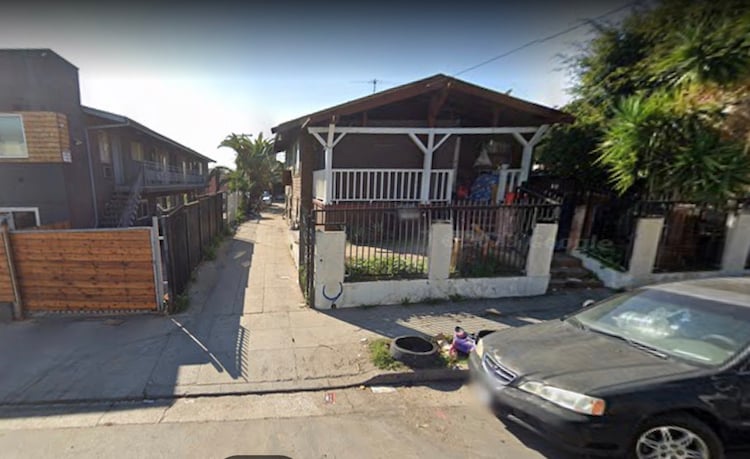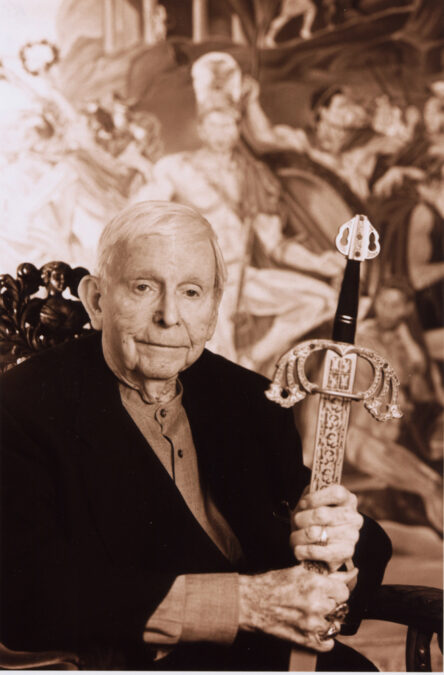
A former home of gay rights pioneer Morris Kight, considered by some people as “the birthplace of the modern LGBTQ civil rights movement,” was designated a historic-cultural monument with a special stipulation that the building cannot be moved from its Westlake location. Photo: Google Earth
A former home of gay rights pioneer Morris Kight, considered by some people as “the birthplace of the modern LGBTQ civil rights movement,” was designated a historic-cultural monument with a special stipulation that the building cannot be moved from its Westlake location.
The Los Angeles City Council approved the protective status for the “Morris Kight home” in a unanimous 15-0 vote during its Tuesday morning meeting.
The designation is especially significant as LGBTQ+-related sites are underrepresented in preservation efforts.
Only 2% of L.A. sites acknowledge LGBTQ history, including the Black Cat and Mattachine Steps in Silver Lake and Oil Can Harry’s in Studio City.
The “Morris Kight home,” located at 1822 W. Fourth St., is a California craftsman bungalow built in 1911.
The building is significant because numerous important moments in LGBTQ+ culture and history took place within those walls. Kight lived at the home from 1967 to 1974.
The “Morris Kight home” was the meeting place of the Los Angeles chapter of the Gay Liberation Front and associated with the creation of the Christopher Street West gay Pride parade and the Gay Community Services Center (now the Los Angeles LGBT Center), among other milestones.
The “Morris Kight home” was named to the National Register of Historic Places in 2022.
During Tuesday’s meeting, the council approved an amendment to the landmark nomination that not only preserves the “Morris Kight home,” but also mandates that the structure can’t be moved. The additional structures on the property will not be covered under the preservation.
The property owner, Sweetzer Lofts, has committed to building affordable housing that’s community-focused, said Councilmember Eunisses Hernandez, whose District One includes the historic “Morris Kight home.”
“We’ve been working toward a solution that not only will save the house at the current site … but it will also be rehabilitated so that it could eventually be open to the public to serve as a hub for the LGBTQIA+ community in our district and beyond,” Hernandez said during the council meeting.
Council President Paul Krekorian says this change elevates the historic monument status to a new level.
“What Councilmember Hernandez has done today with her amendment, and by working with this property owner, is to actually preserve the building,” Krekorian said. “Not just do it on paper, but to actually preserve it.”

Some people consider Morris Kight, who died in 2003, to be the Harvey Milk of Los Angeles and the grandfather of LGBTQ+ rights. Photo: Henning von Berg via Creative Commons/CCBY-SA 4.0 license
Organizers of the SaveMorrisKights4thStreet.com website say the “Morris Kight home” is “the birthplace of the modern LGBTQ civil rights movement.”
Kight’s home was a gay community services center, an outreach center and a meeting place for grassroots activists, actions and causes. Kight personally ran the first ever LGBT crisis hotline, according to the site.
Some people consider Kight, who died in 2003, to be the Harvey Milk of Los Angeles and the grandfather of LGBTQ+ rights.
At the time Kight moved to 1822 West 4th Street, he was already a seasoned anti-war activist and a “one-man gay community services center,” according to the nomination documents.
Kight’s name and phone number were widely known in the gay community because he had printed business cards with his name, address, and telephone number. From the time Kight moved to Los Angeles in 1957/58, he had created a rolodex of doctors, lawyers, and public health workers who would treat and counsel gay men often at his home. He effectively created an underground social service entity for gay men in crisis. His areas of concern included housing, job finding, bail bonds, counseling, identification of resources, and advocacy, according to the nomination papers.
